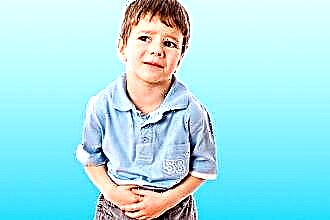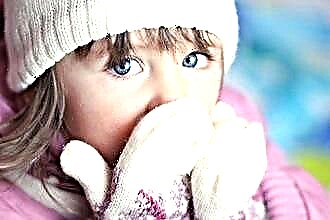When a cough begins in a baby, it always worries the mother, especially if the child is the first-born and all the "children's" problems are experienced for the first time. In fact, you don't always need to worry. In about half of cases, cough has purely physiological reasons and it is easy to get rid of it without any medication.
Therefore, you should not give your child medicine as soon as he coughed a couple of times. Moreover, cough syrup for infants is a completely alien substance for the body, to which it can react with strong side effects - from allergies to diarrhea.
When syrup is not needed
 With a physiological cough, the syrup is completely useless. Therefore, the mother should know how to distinguish such a cough from a pathological one, so as not to give the child another medicine.
With a physiological cough, the syrup is completely useless. Therefore, the mother should know how to distinguish such a cough from a pathological one, so as not to give the child another medicine.
One of the first signs of a physiological cough is the complete absence of other respiratory symptoms. That is, the baby feels great, eats and sleeps normally, plays actively during wakefulness, but from time to time “coughs”.
This cough can be caused by the following reasons:
- too dry air in the room, more often in winter, when heating devices are constantly working;
- a sharp temperature drop - and this happens in the summer, if, after a hot street, you bring the baby into an air-conditioned room;
- exposure to external irritants: polluted air, smoke, a strong aroma of perfume, household chemicals, unpleasant odors;
- ear problems: from banal sulfur plug to otitis media;
- the ingress of a foreign body - and not only into the throat, but also into the nasal passage.
Important! If a small foreign object gets into the throat, the baby immediately has a strong attack of a barking cough, possibly a feeling of suffocation. If something very small is stuck in the nose, then the cough may be intermittent, but the child will have snot flowing profusely, usually from one nostril.
Teething, which is accompanied by profuse salivation, also becomes a non-infectious cause of cough in an infant older than 6 months. A child, who is forced to spend most of the time in a supine position, simply does not have time to swallow saliva and coughs. Due to the increase in temperature, mothers often confuse such a cough with a cold and give the baby cough syrup, which can even harm if it increases the amount of sputum secreted.
See a doctor immediately!
Infectious diseases for newborns are especially dangerous - after all, their immunity has not yet been formed and is not able to protect the body from an aggressive attack of pathogenic microorganisms. At the highest risk group are babies who do not receive breast milk, in which protective antibodies are restrained.
 It is necessary to show the baby to the pediatrician immediately if the cough:
It is necessary to show the baby to the pediatrician immediately if the cough:
- appeared for no apparent reason and does not stop for more than half an hour - most likely a foreign body in the respiratory tract;
- accompanied by wheezing, which is easy to hear without a stethoscope - may be a sign of bronchitis, pleurisy, pneumonia;
- coughing attacks occur systematically at night - the cause may be reflux, heart failure or bronchial asthma;
- streaks or blood clots appear in the child's saliva or snot (or the discharge is evenly colored pink) - blood can be a sign of tuberculosis, oncology, heart attack, lung abscess;
- the color of mucous secretions is yellow, green, orange or dark brown - this may indicate the presence of purulent-inflammatory processes;
- body temperature is kept within the subfebrile range for several days or has risen sharply to values above 38OWITH.
Giving the child only cough syrup in this case, hoping that the body itself will cope with the disease is not just irresponsible, but sometimes deadly.
Infections such as measles, whooping cough, diphtheria, scarlet fever in children under one year old, if untreated, develop rapidly and give complications that can be fatal.
Best syrups
 A cough syrup for children under one year old should be chosen by a doctor. Just as there are different types of cough: dry, wet, paroxysmal, barking, etc., there are several groups of drugs: antitussive, mucolytic, expectorant and combined. Their mechanisms of action differ from each other, therefore, with different types of cough, one remedy can help, and the other can harm.
A cough syrup for children under one year old should be chosen by a doctor. Just as there are different types of cough: dry, wet, paroxysmal, barking, etc., there are several groups of drugs: antitussive, mucolytic, expectorant and combined. Their mechanisms of action differ from each other, therefore, with different types of cough, one remedy can help, and the other can harm.
Mothers who love everything natural and prefer to treat their child with herbal decoctions and homemade syrups should be no less careful. Not all plants used in such cases can be given to children under one year old - some of them can cause severe allergies and even poisoning, especially if the permissible concentration is exceeded.
 Therefore, it is advisable not to experiment with babies. It is better to buy a cough syrup specially developed by pharmacists for children under 1 year old and give it to the child, strictly observing the frequency and dosage specified in the instructions.
Therefore, it is advisable not to experiment with babies. It is better to buy a cough syrup specially developed by pharmacists for children under 1 year old and give it to the child, strictly observing the frequency and dosage specified in the instructions.
Pediatricians consider the following remedies to be the most effective drugs for the smallest:
- "Alteika". In pharmacies, ready-made syrup or dry mixture is sold, which only needs to be diluted with water in the specified proportion. One of the most effective and safe remedies tested by several generations of mothers. The advantage of the potion is that it does not contain sugar and can be given to children with diabetes.
- "Herbion". Delicious and effective based on plantain extract. Perfectly softens the driest cough, has anti-inflammatory properties, restores the affected mucous membranes. Virtually no contraindications.
- "Licorice root syrup." Another of the years proven effective means that you can give to babies. Contains natural antiviral components, therefore it is especially effective in the treatment of acute respiratory infections and acute respiratory viral infections. In case of an overdose, allergies often occur, you need to be careful.
- "Prospan". Combined preparation with mucolytic and antitussive action, based on ivy leaf extract. It is especially effective in the treatment of bronchitis and pneumonia. Expands the bronchi, relieves bronchospasm, dilutes phlegm, has an anti-inflammatory effect.
- Travisil. Completely natural preparation, which is made up of extracts of more than 10 medicinal plants. Expands the bronchi, relieves inflammation, improves blood circulation, promotes coughing up phlegm, strengthens the immune system. Menthol makes breathing easier and relieves coughing fits.
- "Doctor IOM". Consists of extracts of 11 medicinal plants, does not contain chemical components. Mucolytic drug that facilitates the discharge of phlegm and has soothing and anti-inflammatory properties.
- "Lazolvan". An improved version of "Ambroxol" supplemented with ascorbic acid with an excellent mucolytic effect, at the same time stimulating the immune system.
 "Ascoril". Combined preparation based on salbutamol and bromhexine. Able to quickly relieve an attack of bronchial asthma and allergic cough, it is effective for tuberculosis, whooping cough, cystic fibrosis.
"Ascoril". Combined preparation based on salbutamol and bromhexine. Able to quickly relieve an attack of bronchial asthma and allergic cough, it is effective for tuberculosis, whooping cough, cystic fibrosis.- Jocet. A combined preparation containing an antispasmodic that relieves bronchial spasm. It relieves attacks of unproductive coughing, liquefies phlegm, facilitates its discharge.
- Eucabal. Natural syrup with good mucolytic effect based on plantain and thyme extracts. Shows the best results with inflammation of the upper respiratory tract: laryngitis, tracheitis, etc.
Important! There are a number of cough medicines, the use of which is strictly prohibited for children under one year old. These are drugs based on acetyl or carbocysteine, which cause severe respiratory complications in infants. DO NOT give your baby: "Medox", "Fluiditek", "Mukodin", "Fluimucil", "Mukomist", "Fluifort"!
If you have the slightest doubt about the correctness or advisability of choosing one or another cough remedy for children under one year old, be sure to consult your doctor or pharmacist. It is better to ask a few “stupid” questions than to get unwanted side effects or complications for the child.
Home alternative
In folk medicine, there are many recipes that you can use to make cough syrup for babies yourself. It's not a fact that a young mother, who is already loaded with caring for a child, should spend extra time on this, but if you really really want to give your baby a completely natural medicine, then you can try to make it.
 First you need to prepare the sugar syrup. Pour a glass of sugar with half a glass of water, bring to a boil over very low heat and then cook, stirring constantly, until the sugar completely dissolves and acquires a beautiful caramel color. You can add to the finished syrup (stirring it constantly!):
First you need to prepare the sugar syrup. Pour a glass of sugar with half a glass of water, bring to a boil over very low heat and then cook, stirring constantly, until the sugar completely dissolves and acquires a beautiful caramel color. You can add to the finished syrup (stirring it constantly!):
- carrot juice in a ratio of 1: 2;
- beet juice in a 2: 1 ratio;
- cabbage juice in a 1: 1 ratio;
- lemon juice in a 1: 1 ratio;
- plantain leaf juice in a ratio of 1: 3;
- ginger root juice in a 1: 2 ratio.
All juices must be squeezed out immediately before adding to the ready-made syrup - upon contact with air, they quickly lose their medicinal properties. The dosage depends on age - from 0.5 to 1 teaspoon 3-4 times a day.
The duration of the course of treatment with folk remedies is from 7 to 14 days. Even if the cough has almost stopped, it is better to serve the syrup to the baby for a couple of days to avoid it turning into a lingering residual.
Instead of or together with syrups, you can give the child weak decoctions of medicinal herbs: chamomile, fennel, linden, rose hips. They have excellent anti-inflammatory properties, perfectly moisturize and restore mucous membranes and promote the elimination of toxins from the body. In the absence of allergies to bee products, a little honey is added to warm herbal gulls.
If the cough at home treatment has not decreased by 3-5 days and has not completely disappeared in 2-3 weeks, a consultation with a doctor is required. In infants, the cough very quickly turns into a chronic form, after which it can be very difficult to get rid of it. Therefore, it is important to bring the treatment to the full recovery of the baby.

 "Ascoril". Combined preparation based on salbutamol and bromhexine. Able to quickly relieve an attack of bronchial asthma and allergic cough, it is effective for tuberculosis, whooping cough, cystic fibrosis.
"Ascoril". Combined preparation based on salbutamol and bromhexine. Able to quickly relieve an attack of bronchial asthma and allergic cough, it is effective for tuberculosis, whooping cough, cystic fibrosis.

